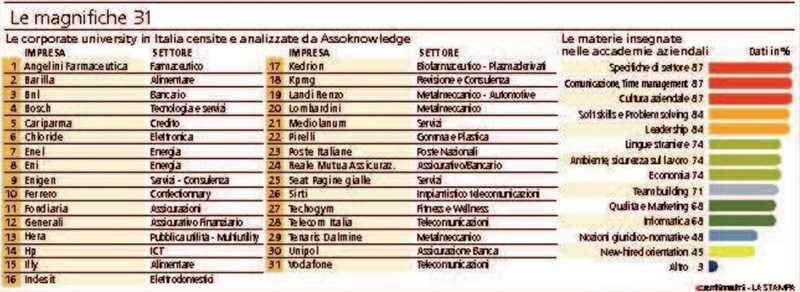Can investment in training encourage economic recovery? In almost every country in the world people are realising that not only education for children but also, perhaps even particularly, training for workers can bring benefits for the economy and consequently for the country’s entire community. Francesco Sacco, retired professor from Bocconi University and government consultant for the implementation of the Digital Diary, spoke at the event “Digital for growth” held on 23 October in Turin. He explained scientifically why other countries are slowly coming out of the crisis while Italy is still here, in midstream: we only need to see how investments have been made during the last 30 years in various countries for us to understand the potential they have been able to develop in order to emerge in the new technological social context that is taking shape. These investments have essentially been made in communication technology, in the “information highway” and, recently, in the fundamental dimension of human capital, in people’s skills, knowledge and information. Last week in “La Stampa” there was an interesting article about the constitution of the Corporate University in Italy. Companies have decided to create their own universities to train, internally, Italian talent.  As reported in the article : “In the United States there are four thousand, in our Country less than forty, but a merely quantitative comparison, although harsh, has little sense. Company universities (Corporate universities, Academies) are increasing throughout the world, despite the crisis, or perhaps exactly for this reason, and they are growing stronger also in Italy. After the pioneering experiences of General Motors (1927) and GeneralElectric (1956), the first, true business realities at university level in the United States were those of Walt Disney and Motorola in 1981. In 1988 there were 400, but already by 1997 there were a thousand and four thousand are forecast by 2015. In Italy there are many fewer, but the issue is on the agenda for many businesses, even medium-sized ones, which count on the knowledge and talents of their employees in order to be competitive”. Even though there are different forms and models, Company Academies are different from private universities and business schools: their distinctive characteristic is the fact that they are owned and directly managed by the corporation which created them and therefore exist as functional to the strategic objectives of the same. Three elements are fundamental from the strategic point of view in the context of internal company communication:
As reported in the article : “In the United States there are four thousand, in our Country less than forty, but a merely quantitative comparison, although harsh, has little sense. Company universities (Corporate universities, Academies) are increasing throughout the world, despite the crisis, or perhaps exactly for this reason, and they are growing stronger also in Italy. After the pioneering experiences of General Motors (1927) and GeneralElectric (1956), the first, true business realities at university level in the United States were those of Walt Disney and Motorola in 1981. In 1988 there were 400, but already by 1997 there were a thousand and four thousand are forecast by 2015. In Italy there are many fewer, but the issue is on the agenda for many businesses, even medium-sized ones, which count on the knowledge and talents of their employees in order to be competitive”. Even though there are different forms and models, Company Academies are different from private universities and business schools: their distinctive characteristic is the fact that they are owned and directly managed by the corporation which created them and therefore exist as functional to the strategic objectives of the same. Three elements are fundamental from the strategic point of view in the context of internal company communication:
- Community or a sense of belonging
- A thorough knowledge of the reality and the history of the company
- Development, on a competence level, of the “skills” most useful to the company.
Obviously it is necessary to develop suitable technology, such as e-learning and corporate intranet programs, intended not as a simple form of learning via computer but as a method of continuous and, perhaps, bidirectional, sharing of knowledge and innovation. Start-up costs of corporate Academies can be high, both in terms of creating content as well as the choice of the most suitable technology in order to guarantee its full use “in every moment and in every place”. However, costs could be cushioned by collaborating with other companies, for example with the use of bilateral funds for continuous training or with public buildings. In some cases, as can happen in many American realities, costs could be recovered by giving access, for issues the company considers most appropriate, to third parties for paid courses. In this way, it would be possible to hold recognised courses with university credits or even, in some cases (but this happens only abroad), with the possibility to obtain real academic titles. Again in the “La Stampa” article, it is interesting to see which subjects are taught: they go from specific topics of the sector in which they belong to foreign languages, safety and the environment, and even touch subjects such as company culture, time management, leadership, problem solving, team building and other topics on soft skills. We hope that Italian companies are starting to wake up from the lethargy that characterises “old” investments, in order to seriously change their ideas and realise that the true capital, the true force of a flourishing economy is in the PEOPLE and in their degree of training, at all levels. Paola Pezzuto